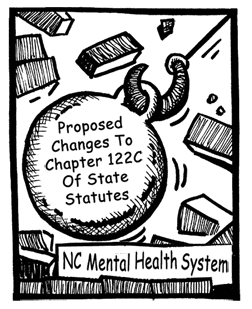 Not content with just being the model for the restructuring of the state’s MH/DD/SAS system, Piedmont Behavioral Health is apparently ready to take a wrecking ball to a system already teetering on collapse. In a planning document dated 9/26/11,“Proposed Changes to 122C and Public Authority Comparison Chart,” proposed changes would:
Not content with just being the model for the restructuring of the state’s MH/DD/SAS system, Piedmont Behavioral Health is apparently ready to take a wrecking ball to a system already teetering on collapse. In a planning document dated 9/26/11,“Proposed Changes to 122C and Public Authority Comparison Chart,” proposed changes would:
- Remove requirements that county commissioners serve on LME boards as well as requirements for geographical representation
- Remove counties from virtually any control over LMEs
- Exempt LMEs from the Local Government Finance Act and remove fund balance restrictions
- Allow LMEs to purchase, hold title, improve and finance real estate
- Grant exemptions to the state’s Public Records Law that keeps LMEs from controlling the use of intellectual property
- Allow LMEs to “take advantage of any emerging opportunities” in introducing new product lines and services
- Exempt LME staff from the State Personnel Act and remove salary limitations
- Have Medicaid waiver appeals heard by a DMA hearing officer rather than the Office of Administrative Hearing
Essentially, the proposal has the new waiver entities, already being rebranded as MCO/LMEs (Managed Care Organizations) to enjoy the best of being both a private and a public entity. The continued push to privatize by PBH is light years beyond outrageous, especially when the state’s system has had to face change after change after change.
If the intent is to kill off the state system as we know it, and I believe it is, then it will likely succeed. Proponents of change will just have to use the right buzzwords and the GOP-dominated legislature that approved waiver expansion and other changes a few months ago, will do so again with this legislation when it convenes in special session next month.
During last week’s Crucial Conversations sponsored by NC Policy Watch, Disability Rights North Carolina Executive Director Vicki Smith spoke to issues facing mental health services in light of recent Department of Justice findings, noting the state is always in crisis mode and has never had nor taken the opportunity to “sit down and develop a long term plan on how it provides services, because the very structure of how policy is made is short term.”
The Department of Justice findings represent that opportunity, she said, the opportunity to “get out of the cycle of responding to the immediate crisis and short term budget restrictions” and to shift our focus “away from responding to … the crisis du jour … and protecting the status quo” to building an effective system of care that gives individuals with disabilities real choices about where they live and services that promote skills and independence.”
Trouble is, it’s hard as hell to think, much less create a vision, in a construction site, especially when no one has the slightest idea of what is being built. Common sense would dictate stepping back to develop a set of blueprints before returning to work. To do otherwise is not only stupid, but inhumane.
David Cornwell
Executive Director
North Carolina Mental Hope

Speak Your Mind